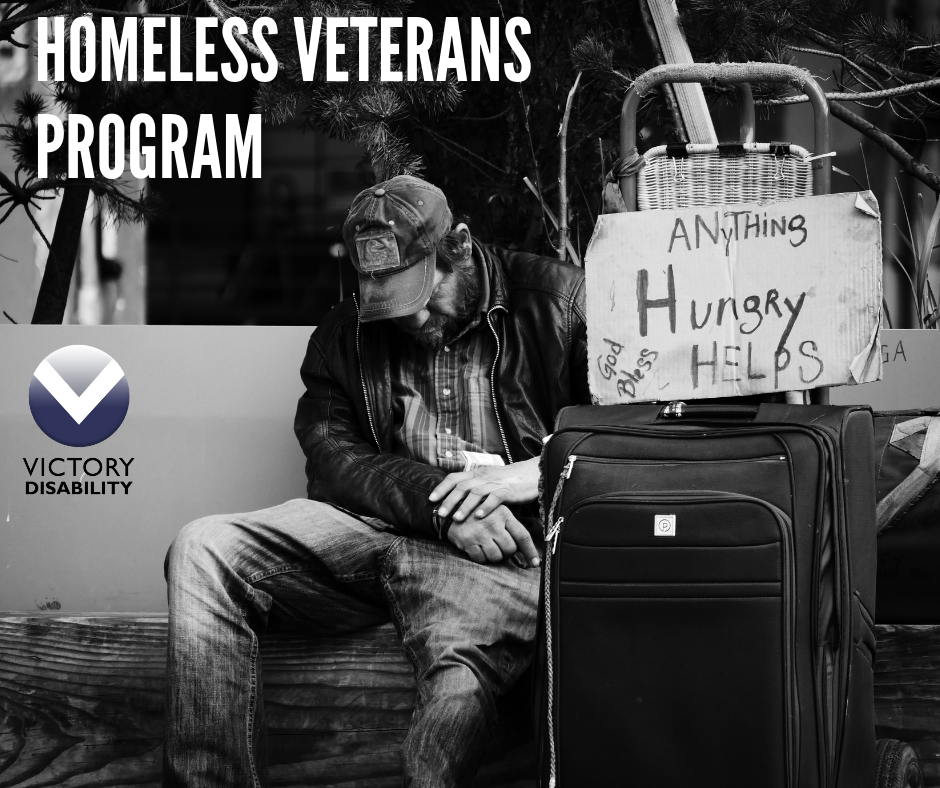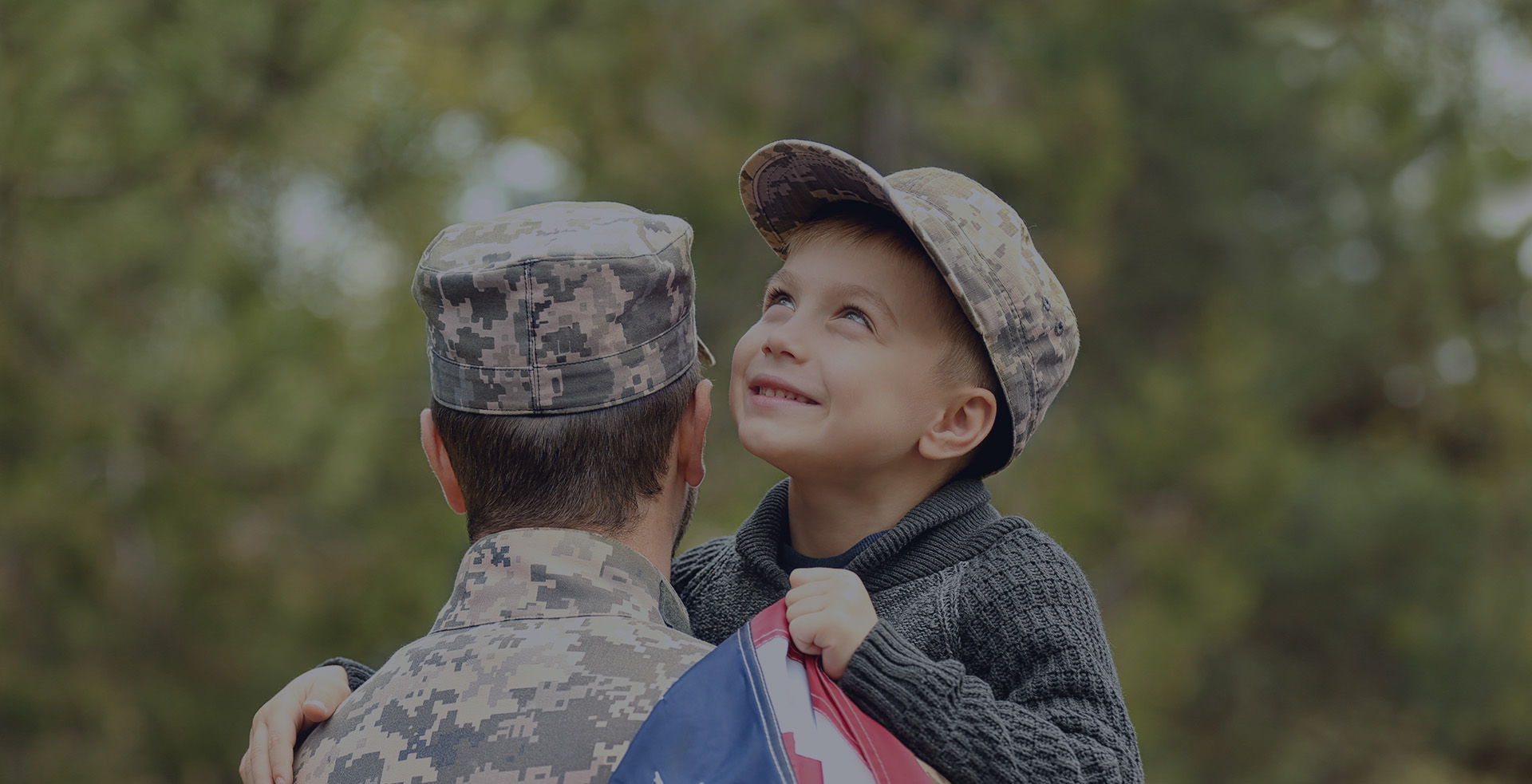
26 Jun Homeless Veterans Program
VA has many benefits and services to assist homeless veterans. Disability benefits, education, health care, rehabilitation services, residential care, and compensated work therapy. These are among the services offered to eligible veterans. Help and questions can also be found in the Vets Disability Guide.
One-third of adult homeless men and nearly one-quarter of all homeless adults have served in the armed forces. There is no true measure of the number of homeless veterans. It has been estimated that fewer than 200,000 veterans may be homeless on any given night. Also, twice as many veterans experience homelessness during a year. Many veterans are considered at risk because of poverty, lack of support and precarious living conditions. Ninety-seven percent of homeless veterans are male and the vast majority are single. About half of homeless veterans suffer from mental illness and more than two-thirds suffer from alcohol/drug abuse problems. Nearly 40 percent have both psychiatric and substance abuse disorders.
The Department of Veterans Affairs (VA)
The only federal agency that provides substantial hands-on assistance directly to homeless people. Last year, VA provided health care services to more than 100,000 homeless veterans. While also providing services to 70,000 veterans in its specialized homeless programs. More than 40,000 homeless veterans receive compensation or pension benefits annually. VA’s major homeless programs constitute the largest integrated network of homeless assistance programs in the country. Offering a wide array of services and initiatives to help veterans recover from homelessness and live as independently as possible. Nearly three-quarters of homeless veterans contacted use VA health care services and 55 percent have used VA homeless services.
(VA) is the only federal agency that provides substantial hands-on assistance directly to homeless people. Last year, VA provided health care services to more than 100,000 homeless veterans and provided services to 70,000 veterans in its specialized homeless programs. More than 40,000 homeless veterans receive compensation or pension benefits annually. Although limited to veterans and their dependents, VA’s major homeless programs constitute the largest integrated network of homeless assistance programs in the country, offering a wide array of services and initiatives to help veterans recover from homelessness and live as self-sufficiently and independently as possible. Nearly three-quarters of homeless veterans we have contacted use VA health care services and 55 percent have used VA homeless services.
VA, using its own resources or in partnerships with others, has secured more than 15,000 residential rehabilitative, transitional and permanent beds for homeless veterans throughout the nation. VA spends more than one billion dollars from its health care and benefit assistance programs to assist tens of thousands of homeless and at-risk veterans. To increase this assistance, VA conducts outreach to connect homeless veterans to both mainstream and homeless-specific VA programs and benefits.
These Programs Include:
- Aggressive outreach to veterans living on the streets and in shelters who otherwise would not seek assistance;
- Clinical assessment and referral for treatment of physical and psychiatric disorders, including substance abuse;
- Long-term transitional residential assistance, case management and rehabilitation; and,
- Employment assistance and linkage with available income supports and permanent housing.
VA has awarded more than 400 grants to public and nonprofit groups to assist homeless veterans in 50 states. They provide transitional housing, service centers, and vans to provide transportation to services and employment. VA sponsors and supports national, regional and local homeless conferences and meetings, bringing together thousands of homeless providers and advocates to discuss community planning strategies and to provide technical assistance in such areas as transitional housing, mental health and family services, and education and employment opportunities for the homeless.
VA Homeless Programs
VA’s Health Care for Homeless Veterans Program (HCHV) operates at 133 sites, where extensive outreach, physical and psychiatric health exams, treatment, referrals and ongoing case management are provided to homeless veterans with mental health problems, including substance abuse. This program assesses more than 40,000 veterans annually. VA’s Domiciliary Care for Homeless Veterans (DCHV) Program provides medical care and rehabilitation in a residential setting on VA medical center grounds to eligible ambulatory veterans disabled by medical or psychiatric disorders, injury or age and who do not need hospitalization or nursing home care. There are more than 1,800 beds available through the program at 34 sites. The program provides residential treatment to more than 5,000 homeless veterans each year. The domiciliary conduct outreach and referral; admission screening and assessment; medical and psychiatric evaluation; treatment, vocational counseling and rehabilitation; and post-discharge community support.
Veterans Benefits Assistance
Veterans Benefits Assistance at VA Regional Offices is provided by designated staff members who serve as coordinators and points of contact for homeless veterans. Homeless coordinators at VA regional offices provide outreach services and help expedite the processing of homeless veterans’ claims. The Homeless Eligibility Clarification Act allows eligible veterans without a fixed address to receive VA benefits checks at VA regional offices. VA also has procedures to expedite the processing of homeless veterans’ benefits claims. Last year more than 35,000 homeless veterans received assistance and nearly 4,000 had their claims expedited by Veterans Benefits Administration staff members.
Acquired Property Sales for Homeless Providers Program makes properties VA obtains through foreclosures on VA-insured mortgages available for sale to homeless providers at a discount of 20 to 50 percent. To date, more than 200 properties have been sold. These properties have been used to provide homeless people, including veterans, with nearly 400,000 sheltered nights in VA acquired property. Readjustment Counseling Service’s Vet Centers provide outreach, psychological counseling, supportive social services and referrals to other VA and community programs.
Veteran Centers
Every Vet Center has a homeless veteran coordinator assigned to make sure services for homeless veterans are tailored to local needs. Annually, the program’s 207 Vet Centers see approximately 130,000 veterans and provide more than 1,000,000 visits to veterans and family members. More than 10,000 homeless veterans are served by the program each year. Veterans Industry/Compensated Work-Therapy (CWT) and Compensated Work-Therapy/Transitional Residence (TR) Programs Through its CWT and TR programs, VA offers structured work opportunities and supervised therapeutic housing for at-risk and homeless veterans with physical, psychiatric and substance abuse disorders. VA contracts with private industry and the public sector for work by these veterans, who learn new job skills, re-learn successful work habits and regain a sense of self-esteem and self-worth.
Veterans are paid for their work and, in turn, make a payment toward maintenance and upkeep of the residence. VA operates 66 homes with more than 520 beds in transitional residences. Nine sites with 18 houses serve homeless veterans exclusively. Two-thirds of all CWT and TR beds served homeless veterans.
CWT Programs
There are more than 110 CWT operations nationwide. Approximately 14,000 veterans participate in CWT programs annually. VA’s National Cemetery Administration and Veterans Health Administration have formed partnerships at national cemeteries, where formerly homeless veterans from the CWT program have received therapeutic work opportunities while providing VA cemeteries with a supplemental work force. HUD-VA Supported Housing (VASH) Program, a joint program with the Department of Housing and Urban Development (HUD), provides permanent housing and ongoing treatment to homeless mentally ill veterans and those suffering from substance abuse disorders. HUD’s Section 8 voucher program has designated more than 1,750 vouchers worth $44.5 million for chronically mentally ill homeless veterans, and VA personnel at 34 sites provide outreach, clinical care and case management services. This approach significantly reduces homelessness for veterans plagued by serious mental illness and substance abuse disorders.
VA’s Supported Housing Program allows VA personnel to help homeless veterans secure long-term transitional or permanent housing. They also offer ongoing case management services to help the veterans remain in housing they can afford. VA staff work with private landlords, public housing authorities and nonprofit organizations to find housing arrangements. Veteran service organizations have been instrumental in helping VA establish these housing alternatives nationwide. VA staff at 22 supported housing program sites helped more than 1,400 homeless veterans find housing in the community.
Stand Downs
Stand Downs are one-to three-day events that provide homeless veterans a variety of services. This allows the VA and community-based service providers to reach more homeless veterans. Stand downs give homeless veterans a temporary refuge where they have access to certain necessities. They can obtain food, shelter, clothing and a range of community and VA assistance. In many locations, stand downs provide health screenings, referral and access to long-term treatment. Also, benefits counseling, ID cards and access to other programs to meet their immediate needs. Each year, VA participates in more than 100 stand downs coordinated by local entities. Surveys show that more than 23,000 veterans and family members attend these events with more than 13,000 volunteers contributing annually. VA Excess Property for Homeless Veterans Initiative provides federal excess personal property, such as clothing, footwear, sleeping bags, blankets .
This initiative has been responsible for the distribution of more than $125 million in material and currently has more than $15 million in inventory. This initiative employs formerly homeless veterans to receive, warehouse and ship these goods to homeless programs across the country that assist veterans. The Homeless Providers Grant and Per Diem Program provides grants and per diem payments to help public and nonprofit organizations establish and operate new supportive housing and service centers for homeless veterans. Grant funds may also be used to purchase vans to conduct outreach or provide transportation for homeless veterans. Since the program’s inception in fiscal year 1994, VA has awarded more than 400 grants to faith and community-based service providers, state or local government agencies and Native American tribal governments in 50 states and the District of Columbia.
Project CHALENG
Up to 20,000 homeless veterans are expected to be provided supported housing under this program annually in the more than 10,000 beds. Project CHALENG (Community Homelessness Assessment, Local Education and Networking Groups) for Veterans is a nationwide initiative in which VA works with other federal, state and local agencies and nonprofit organizations to assess the needs of homeless veterans. CHALENG groups have held conferences, developed directories of local resources available to homeless veterans and established local action plans to fight homelessness and prepare strategies for future actions. Program Monitoring and Evaluation conducted by the Northeast Program Evaluation Center at the VA Connecticut Health Care System provides important information about the veterans served and the therapeutic value and cost-effectiveness of VA’s specialized homeless programs.
Information from these evaluations also helps program managers determine new directions for expanding and improving services to homeless veterans. VA conducted a one-day census to determine the extent of homelessness among veterans in VA’s acute inpatient programs. They found that one-quarter of all veterans in VA beds were homeless. Initiatives The Multifamily Transitional Housing Loan Guarantee for Homeless Veterans Program has made several conditional commitments. These are to establish housing for formally homeless veterans. VA’s 15-member Advisory Committee on Homeless Veterans submitted its third annual report. This was to provide advice and recommendations of benefits and services to homeless veterans.
VA Secretary R. James Nicholson sits as lead member of the U.S. Interagency Council on the Homeless. The reactivated council focuses a ttention on and coordinates efforts aimed at ending chronic homelessness. The U.S. Department of Labor and VA are collaborating on a pilot project to assist veterans discharging from incarceration to avoid homelessness and reincarceration.
Getting help
If you, or a veteran you know, are at risk of homelessness contact VA’s National Call Center for Homeless Veterans at 877-4AID-VET (877-424-3838) to speak to a trained VA responder. Also learn more about how you can receive help in the Vets Disability Guide.


